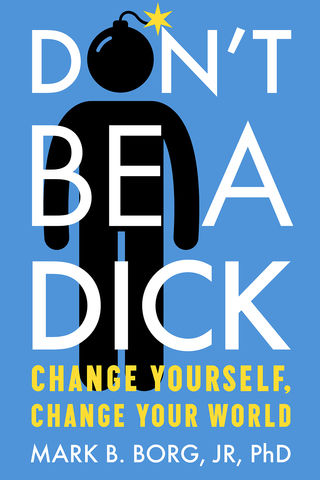Environment
Don’t Be a Dick
The Book Brigade talks to psychologist Mark Borg.
Posted September 12, 2019 Reviewed by Lybi Ma

The world is filled with jerks. Dicks are a special breed of jerk—they give offense to the world without a shred of awareness that they’re doing so, and deny they have a role when relationships go wrong. The sad truth is, anybody can be a dick sometimes.
How does anyone know when he or she is being a jerk?
Of the numerous people I've told about this book so far, many have said something like:
"Wow, that's great! I am for sure going to buy a whole bunch of copies!"
"What?" I reply, "Why a whole bunch?"
"Because," answers the potential good customer, "I'm going to get one for everyone in my____________" (usually the answer is either "family" or "office”).
Seeing dick behavior in others—like the old "you spot it you got it"—is a very good measuring device for knowing when you're being a dick. Being a dick operates as a defense against recognizing, acknowledging, and owning one’s own part in sustaining a very conflicted relationship with the world.
The world will work very hard to help you know when you're being a dick; hearing it is another matter. In order to know when one is a jerk one must somehow outflank or loosen the defenses (usually acted out in what I call "dickery") so that we can see ourselves in an adversarial relationship with the world.
So the best way to know that this book is for you is that you thought you bought it for someone else.
What are the telltale signs?
The typical jerk is a perceived as a mean-spirited, self-serving individual who thinks and acts as though everyone else in the world can only be understood—and whose only importance is defined—in terms of their relationship to her- or herself. But this does not get at the ways that the dick's behavior, although it looks and feels offensive, it is actually acting as a psychological defense that blocks awareness of more vulnerable feelings like insecurity, fear and hurt.
There is a wonderful quote from Alcoholics Anonymous that says, "We step on the toes of our fellows and they retaliate. Sometimes they hurt us, seemingly without provocation, but we invariably find that…we have made decisions based on self which later placed us in a position to be hurt." This is the attitude of "It's not me it's you” is the root cause—as well as the telltale sign par excellence—of dickery. It is the attitude that underlies the jerk's inability to see that what she or he experiences as unprovoked attacks are actually counterattacks.
Are dicks different from garden-variety jerks? And if so, how so?
When someone has been labeled, characterized, or singled out for their offensive behavior toward the world (that is, other people in it), it doesn't matter what you call them. You can call yourself anything you want (from "bleep" to jerk to motherf*ker). It's not the word you use, but how you use it—the what's it for of your behavior—that tells the world: This is a dick.
If you have your own garden-variety behavior, a self-absorbed way of relating that is hurtful and offensive to other people, then you most likely qualify for what I am referring to as "dick" no matter what word you use to soften the blow. So, dicks and jerks and motherf*kers can be the same creature according to how they relate to themselves, others and the world.
How does dickish behavior arise and become part of a person’s repertoire?
It is righteous indignation that tends to justify and fuel dickery. Dickish behavior is an adaption that works initially as a coping mechanism to decrease one's awareness of living in what otherwise feels like a hostile environment. From this environment, the budding dick comes to "trust" that she or he can count on others to hurt, exploit and disappoint. This trust works to establish a sense of self-sufficiency where the dick believes that she or he can count on—and therefore needs—no one. For the dick, a sense of chronic injustice rationalizes offensive/defensive behavior that separates her- or himself from a world that feels—usually from early in one's life—unsafe.
How is dickish behavior self-protective?
The dick uses their behavior as a psychological defense against feeling vulnerable. This is experienced as a state of anxious and tentative security, where one sees the motivations and underlying emotions of one's own behavior in others (projection). The dick lives in a state of denial that is fortified by a need to avoid one's own part in whatever goes wrong in a relationship. I ask the reader to see this behavior an adaptation that starts out as a survival mechanism meant to protect oneself from being overwhelmed by anxiety (of an interpersonal nature).
Why do you believe we are experiencing an epidemic of dickish behavior?
With so much angst, so much division in our society (bigotry, exclusion, hypocrisy, assholery), dicks serve as scapegoats for what we don't like and cannot accept about ourselves. Through their behavior they manage to at least look like the one who is responsible for everything that goes wrong in any particular relationship, family, community or society. The dick lets everyone else off the hook for their part of a systemic/relationship issue simply by being a dick. However, the most entitled dicks don’t agree with that assessment, deny being in any way accountable for anything that goes wrong, and, instead, claim responsibility for everything—everything—that goes right!
And the opposite of jerkish behavior is…?
Acceptance of ourselves, others and the world itself—as is.
You flat-out state that being on the lookout for dicks, not having a finely tuned dick detector, is good for relationships. Please explain.
We need to know who the dicks are in our life (the office, extended family, etc.) and maintain physical and emotional distance. But when we deal with the “inner dick,” we will not be so attractive to other dicks. Dicks often find each other. Therefore, dealing with the inner dick protects us from the “outer dick,” so you won't have to monitor and patrol other people's bad behavior.
Could you summarize what you call the Dick Fix? What are the essentials of leaving dickery behind?
The Dick Fix is, perhaps ironically, acceptance of oneself, others and the world. With acceptance comes accountability, and this means being accountable for our own contribution to the world (others), and a sense of ownership. For this I have two rules:
1. Keep the focus on yourself,
2. Refer to rule # 1.
That's it. So much dickery is a reaction triggered by the belief that things are being done to us—things that hurt and scare us and are out of our control. Acceptance, accountability, and ownership (for our part) ultimately allow us to live at peace with ourselves and others.
Is there some ideal response to another person’s dickery?
Hit pause, and don’t engage. This is Satyagraha: Nonviolent protest. It’s a dedicated commitment to harming no one, including ourselves—not putting ourselves in harm's way, not allowing others to mistreat us.
What do you consider the single most important message you would like readers to get from Don’t Be a Dick?
Letting go of the defensive use of dickery establishes a very different way of being in relationship with ourselves, others, and the world. It is a process where changing ourselves can change the world.
About THE AUTHOR SPEAKS: Selected authors, in their own words, reveal the story behind the story. Authors are featured thanks to promotional placement by their publishing houses.
To purchase this book, visit:





